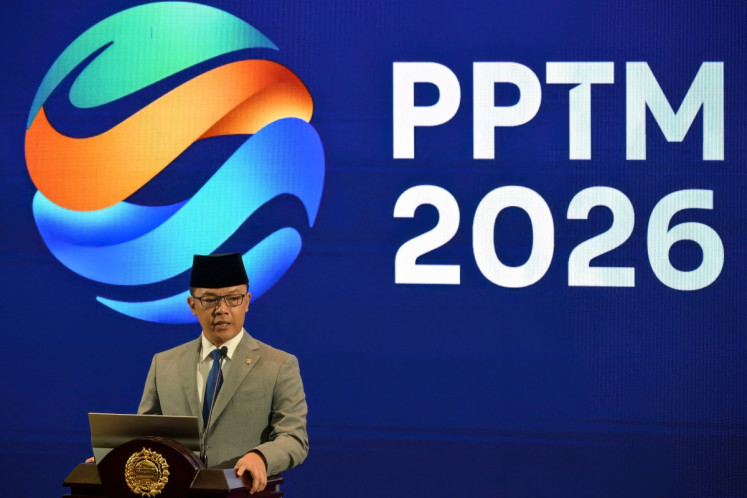Popular Reads
Top Results
Can't find what you're looking for?
View all search resultsPopular Reads
Top Results
Can't find what you're looking for?
View all search resultsJosaphat Tetuko Sri Sumantyo: Getting research off the ground
Josaphat Tetuko Sri Sumantyo, an associate professor at Chiba University in Japan, has created a niche for himself in the international world of radars, microwaves, antennas and remote sensing
Change text size
Gift Premium Articles
to Anyone
Josaphat Tetuko Sri Sumantyo, an associate professor at Chiba University in Japan, has created a niche for himself in the international world of radars, microwaves, antennas and remote sensing.
The Indonesian national never imagined he would one day become an expert in this field, for his childhood dream was to become an architect or aircraft designer.
"Most people see the melting of the ice in the North and South poles as a negative phenomena, but I'm utilizing it's positive effects to help me find a new sailing route for ships traveling to Europe", said that man better known as "Josh", when talking about his latest invention, the CP-SAR.
Josh graduated from Negeri I Solo high school in 1989 and was awarded a Science and Technology Manpower Development Program scholarship offered by B. J. Habibie, the minister of research and technology at that time.
Through this scholarship, Josh obtained a Bachelor and Rotary International Scholarship to undertake his master's degree at Kanazawa University in Japan.
Upon his return to Indonesia, Josh worked as a researcher at the Agency for the Assessment and Application of Technology and the Military Education and Training Command in Bandung. In 1999, he returned to Japan and obtained a PhD from Chiba University, the place where he is currently head of the Microwave Remote Sensing Laboratory.
Josh, who was born on June 25, 1970, managed to complete his PhD within 3 years and was offered a permanent job at Chiba University. In 2004, at the age of 34, this newly recruited lecturer was promoted to associate professor.
He then went on to establish and head the microwave remote sensing laboratory at the Center for Environmental Remote Sensing at Chiba University.
Josh later received a prestigious grant from the Japanese Ministry of Education and Technology, which awarded him with a research grant of 23.54 million yen (approx. US$200,000) to further develop the next generation of Circularly Polarized Synthetic Aperture Radars (CP-SAR).
"The grant I received was utilized to build an anechoic chamber in my laboratory," Josh said, referring to a chamber that provides a shielded environment from radio frequencies and microwaves.
"My latest invention (the CP-SAR) is a multipurpose sensor that can operate in any weather, in the day or night, and can be placed in a microsatellite," Josh said.
Conventional SAR sensors have a limited ability to receive information as they are sensitive to circling electromagnetic waves, high powered, bulky and sensitive. Josh's CP-SAR invention can be placed on a microsatellite, which improves the quality of information retrieved from the Earth's surface.
The CP-SAR Josh invented is not influenced by circling electromagnetic waves in the ionosphere and doesn't need a lot of power. Solar panels can be reduced and a simple radar sensor device can be utilized, reducing the weight and size of the satellite to less than 100 kilograms.
"A CP-SAR sensor, a high resolution digital camera and a plasma probe will be placed in this microsatellite," said Josh, adding that the camera would be used for mapping, environmental and disaster monitoring and for monitoring global heating effects.
The plasma probe will monitor the temperature changes or scan the temperature of the atmosphere.
"(The probe) is very sensitive towards changes to the Earth's atmosphere prior to an earthquake. This phenomena will be detected, to predict the occurrence of an earthquake ... to minimize the number of casualties, the loss of materials and prevent other disasters."
Josh said he would use the satellite to monitor the sea at the North Pole to identify new sailing routes. Research into this, he added, was currently being conducted in cooperation with the world's biggest weather forecaster, Weathernews Corporation.
The satellite was designed to detect icebergs; information collected would be sent to passing ships via Weathernews.
"If we utilize the North Sea, the access to Europe can be shortened by one week ... therefore save on fuel, which will reduce the global warming effect. The current problem is, there are still too many icebergs blocking the way," Josh said.
According to plans, the microsatellite will be launched in 2012.
Though occupied with his work and research, Josh said he still managed to fly home to Indonesia regularly where his wife, who is an assistant professor in Fine Art at the Bandung Institute of Technology, and his son reside.
"While visiting Indonesia, I usually do a series of lectures or seminars at various institutions throughout the country," said the man who is also an adjunct professor at the University of Indonesia, a division head at the CRS Institute of Technology Bandung, and a visiting professor at the University of Udayana as well as a number of other institutions.










